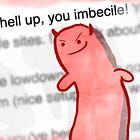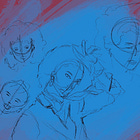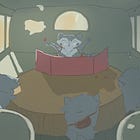What’s good? It occurs to me that newer readers will not have seen my past essays as they are trapped behind the miserable act of scrolling for a while on a webpage. I genuinely would not wish that on my worst enemy (Self-appointed high school debate rival Joseph Bippert). But I’ve picked up a few things from my years teaching writing, and anything not shared regularly becomes lost to you.
The items below are smaller, bastardized summaries of previous letters — some old, some new. We can call them Jade’s Little Bastards. I've wanted to save that name for the day I inevitably started teaching competitive slam poetry to a group of precocious middle schoolers. But it’s best not to let your ideas rot away too long. Without further ado, here are a few writing philosophies and tips I’ve picked up in my decade or so of professional writing.
1. People don’t know who the hell you are.
Unless you are Jane Personal Essay (Joan Didion), you can’t assume that a reader will know a thing about you when they encounter your story. The word “I” has no inherent meaning on the page. You have to deftly insert personal details about yourself so people aren’t subconsciously distracted and untethered while reading your work. Subtly imply demographic information (age, nationality, location) with your lines so readers can instead focus on the important ideas.
2. Don’t describe trash cans.
Do not mistake setting a scene for building a diorama. Bringing a reader into a space does not mean describing everything in that room. We need to be selective with the details we include. We don’t need to read about the trashcan with a half-empty Mr. Pibb inside unless that detail contributes to character, mood, or a deeper theme. Double-check each scene-setting detail to make sure it adds something worthwhile.
3. Discover the statue in the stone.
Michelangelo has a quote: “Every block of stone has a statue inside it, and it is the task of the sculptor to discover it.” When writers fret over a blank page, they are trying to sculpt something with no stone before them. Set a timer, think of the general idea for your story or scene, and write every single stray thought you have in mind. It doesn’t matter if your mind wanders or you throw down song lyrics stuck in your head. The final look of the essay is not important right now. Temporarily silence the critic in your head and get down everything you can. The jumbled mass of general thoughts becomes your stone. You can then spend the later stages of the process chiseling away at it. Ultimately, we are rewriters more so than we are writers.
4. Be bad a lot.
There was a study once where a ceramics class was split into two groups. Group A were told to make one high-quality pot as their semester assignment. Group B had to make 50 pots and were instead graded on quantity. By the end of the semester, the group tasked with quantity also created the best quality pots. The act of creating quickly and learning from mistakes ended up with better results than the group who had to sit around pondering what quality meant.
5. Keep those insecurities on a tight leash for like 10 seconds.
When asking someone to edit your essay, don’t load them up with all of your insecurities about it before they have a chance to read it. If you are aware of a certain area you need help with, by all means, you can have them focus their attention there. But if you are wondering IF there is a problem in your piece, then refrain from biasing your reader for looking for that specific issue that may or may not exist.
6. Just take the compliment.
There’s a fine line between humility and undercutting yourself. Don’t dismiss your work when someone throws praise your way. Unless you live in LA and have very connected parents, it's very unlikely that they are lying to you. When we act dismissively to compliments we’re rejecting human connection. Even if it's only for the brief conversation or the seconds it takes to hit send on a story, stand by your work. It’s easier said than done, but if you want your art to connect with another person (and we all do), you need to, however briefly, believe that there is something worthwhile in how you process and interpret the world.
That’s all for this week. Thanks for reading, especially to those who are out here scanning QR codes on various street poles and bulletin boards across town. Y’all real for that. All art by me.
More words to read!















Good advice, good funny lines, I hope we get more of Jade's Little Bastards soon!